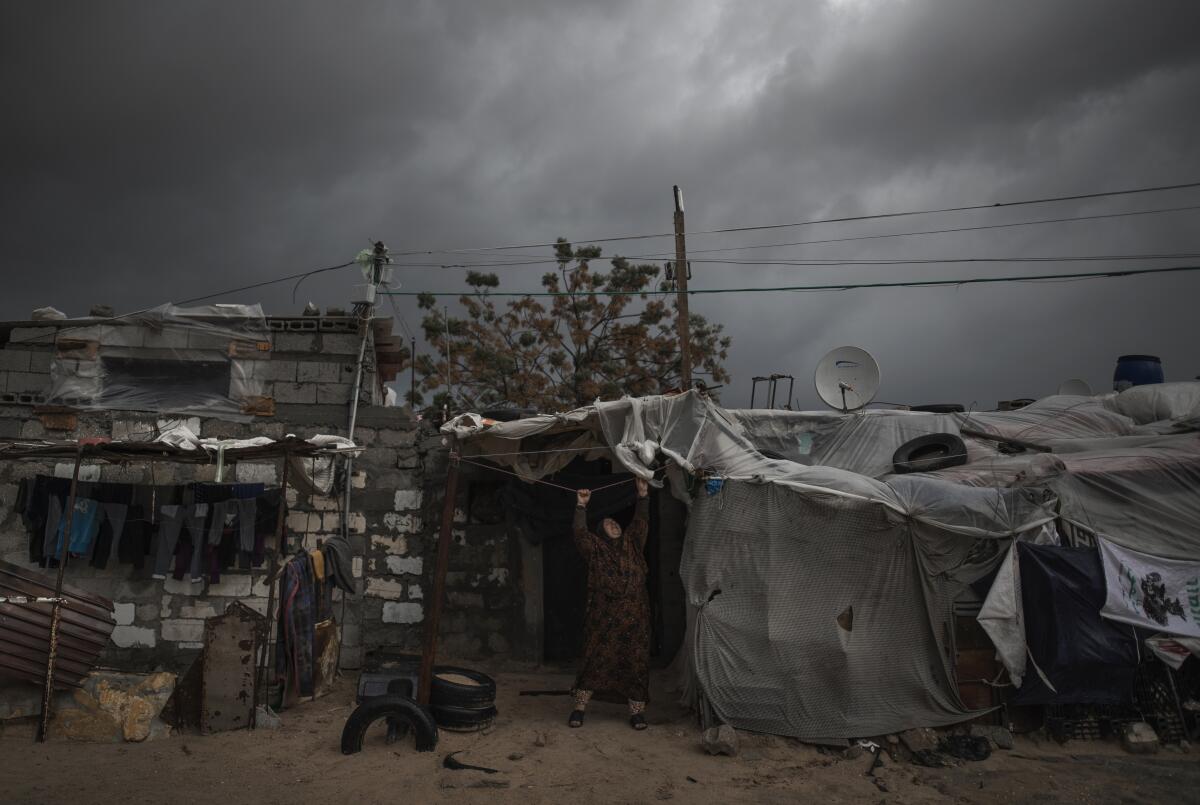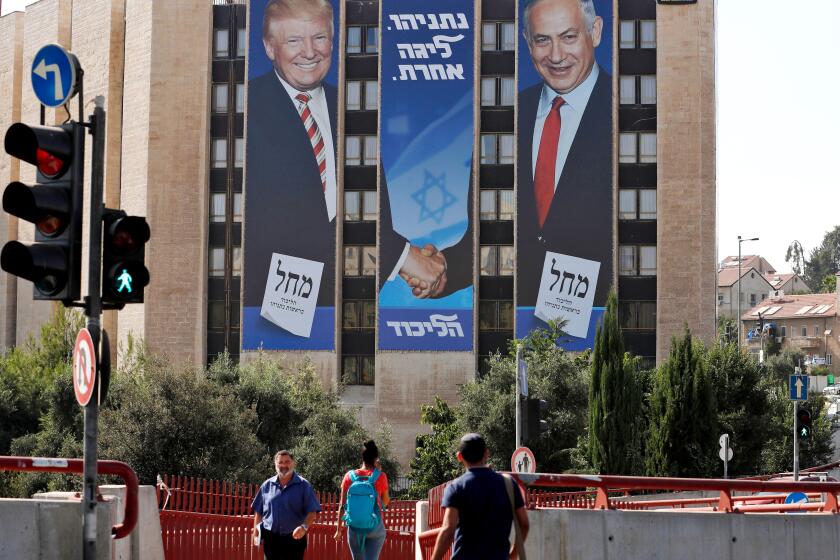Biden announces restoration of U.S. relations and aid to Palestinians

- Share via
UNITED NATIONS — The Biden administration announced Tuesday that it was restoring U.S. relations with the Palestinians and renewing aid to Palestinian refugees — a reversal of the Trump administration’s cutoff and a key element of Biden’s support for a two-state solution to the decades-old conflict between Israelis and Palestinians.
Acting U.S. Ambassador to the United Nations Richard Mills made the announcement at a high-level Security Council meeting, saying the new administration believed that this “remains the best way to ensure Israel’s future as a democratic and Jewish state while upholding the Palestinians’ legitimate aspirations for a state of their own and to live with dignity and security.”
The Trump administration provided unprecedented support to Israel, recognizing Jerusalem as Israel’s capital, moving the U.S. Embassy from Tel Aviv, slashing financial assistance for the Palestinians and reversing course on the illegitimacy of Israeli settlements on land claimed by the Palestinians.
Israel captured East Jerusalem and the West Bank in the 1967 war. The international community considers both areas to be occupied territory, and the Palestinians seek them as parts of a future independent state. Israel has built a far-flung network of settlements that house nearly 700,000 Jewish settlers in the areas.
The peace plan unveiled by Trump a year ago envisions a disjointed Palestinian state that turns over key parts of the West Bank to Israel, siding with Israel on contentious issues such as borders and the status of Jerusalem and Jewish settlements. It was vehemently rejected by the Palestinians.
Mills made clear the Biden administration’s more even-handed approach to the Israeli-Palestinian conflict.
For Israel’s Benjamin Netanyahu, navigating a Biden presidency poses a challenge after going all in with Trump.
“Under the new administration, the policy of the United States will be to support a mutually agreed two-state solution, one in which Israel lives in peace and security alongside a viable Palestinian state,” he said.
Mills said peace couldn’t be imposed on either side and stressed that progress and an ultimate solution required the participation and agreement of Israelis and Palestinians.
“In order to advance these objectives, the Biden administration will restore credible U.S. engagement with Palestinians as well as Israelis,” he said. “This will involve renewing U.S. relations with the Palestinian leadership and Palestinian people.”
Mills added that Biden intended to “restore U.S. assistance programs that support economic development programs and humanitarian aid to the Palestinian people, and to take steps to reopen diplomatic relations that were closed by the last U.S. administration.”
Israel has advanced plans to build 800 new settler homes in the occupied West Bank, a move that could strain ties with President-elect Joe Biden.
Trump cut off funding for the U.N. Relief and Works Agency, which was established to aid the 700,000 Palestinians who fled or were forced from their homes during the war surrounding Israel’s establishment in 1948. The agency provides education, healthcare, food and other assistance to some 5.5 million refugees and their descendants in the West Bank and Gaza Strip, as well as in Jordan, Syria and Lebanon. The U.S. was the major donor, and the loss of funds has created a financial crisis for the agency.
The Trump administration closed the office of the Palestine Liberation Organization in Washington in September 2018, in effect shutting down the Palestinians’ diplomatic mission to the United States.
Mills said the U.S. hoped to start building confidence on both sides to create an environment to reach a two-state solution. “The United States will urge Israel’s government and the Palestinians to avoid unilateral steps that make a two-state solution more difficult, such as annexation of territory, settlement activity, demolitions, incitement to violence, and providing compensation for individuals in prison for acts of terrorism,” he said.
Israel has accused the Palestinians of inciting violence and has vehemently objected to the Palestinian Authority paying families of those imprisoned for attacking or killing Israelis.
Breaking News
Get breaking news, investigations, analysis and more signature journalism from the Los Angeles Times in your inbox.
You may occasionally receive promotional content from the Los Angeles Times.
Before Mills spoke, Palestinian Foreign Minister Riad Malki sharply criticized the Trump administration for using “the United States’ might and influence to support Israel’s unlawful efforts to entrench its occupation and control” and reiterated Palestinian Authority President Mahmoud Abbas’ hopes “for the resumption of relations and positive engagement.”
“Now is the time to heal and repair the damage left by the previous U.S. administration,” he said. “We look forward to the reversal of the unlawful and hostile measures undertaken by the Trump administration and to working together for peace.”
But Israel’s Ambassador to the U.N. Gilad Erdan told the council that instead of focusing on the Israeli-Palestinian conflict, it should focus on Iran, which “does not try to hide its intention of destroying the world’s only Jewish state.”
On the Israeli-Palestinian conflict, he suggested that the council discuss what he called “the real obstacles to peace: Palestinian incitement and culture of hate.”
Israel remains willing to make peace “when there is a willing partner,” Erdan said, accusing Abbas of inciting violence, and saying he should come to the negotiating table “without making outrageous demands and not call for another pointless international conference ... [which] is just a distraction.”
More to Read
Sign up for Essential California
The most important California stories and recommendations in your inbox every morning.
You may occasionally receive promotional content from the Los Angeles Times.















